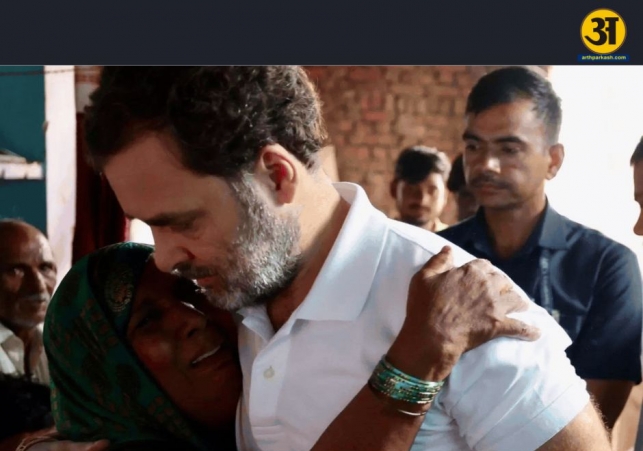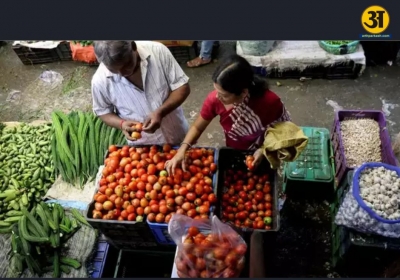
Rahul Gandhi: 'Their words shook me'
Rahul Gandhi expresses shock after meeting Hathras rape victim's family
On December 12, 2024, Rahul Gandhi, the Leader of Opposition in the Lok Sabha, met the family of a 19-year-old Dalit girl who was allegedly gang-raped and died during treatment in 2020. Gandhi visited the victim's home in Bool Garhi village, Hathras, and spent around 35 minutes with the family. After the visit, he expressed his deep concern about the situation the family is facing.
The Congress leader claimed that the family is being treated unfairly by the government, with promises made to them left unfulfilled. According to Gandhi, the family continues to live in fear, constantly monitored by security forces. He said the government has failed to fulfill its promises of providing a government job to one of the family members and relocating them for their safety.
Government's failure to deliver promises
Gandhi pointed out that despite the BJP government's promises to the family, they are still waiting for justice. The victim’s family has not been given a government job, nor has the promise to relocate them been honored. He criticized the government for not giving justice to the family and instead "torturing" them in various ways while the accused remain free.
During his visit, Gandhi shared that the family feels as though they are being treated like criminals, unable to move freely due to constant surveillance. He expressed his concern about how the family continues to live under a cloud of fear. According to Gandhi, the government's actions show the lack of concern for Dalit communities, and he vowed to continue fighting for justice for the victim's family.
The Hathras case gained national attention in September 2020 when the young Dalit woman was allegedly gang-raped by four upper-caste men. After the attack, she was taken to Delhi for treatment but tragically passed away on September 29, 2020. She was cremated the following day, but her family claimed that the police had locked them in their home and hurriedly carried out the last rites without their consent.
The incident took place on September 14, 2020, when the victim was allegedly attacked by four men in Hathras. She was found severely injured and was taken to the hospital in critical condition. She later died from her injuries after being treated in a Delhi hospital. The family claimed that the police delayed registering the case and were insensitive in handling the situation, including forcing them to conduct the cremation against their wishes.
ALSO READ: Forces in India and abroad struggle to accept Nation's progress: VP Dhankhar
ALSO READ: Mumbai Kurla bus crash: death toll reaches six, 49 injured in tragic accident
The incident sparked outrage across India, with many people demanding justice for the victim and her family. The Uttar Pradesh government faced criticism for its handling of the case, and as a result, a CBI inquiry was initiated in October 2020 to investigate the matter.
Despite the investigation, three of the four accused were released in March 2023 by a court in Uttar Pradesh after serving about two years in prison. This decision added to the anger and frustration of the family and supporters, who felt that justice was not being served.
The struggles of the family
In his post on social media, Rahul Gandhi highlighted the struggles faced by the family in the aftermath of the tragic incident. He stated that the family continues to live under constant surveillance, with police keeping an eye on them. Gandhi pointed out that instead of providing justice and support, the government’s actions have further victimized the family.
He also criticized the BJP for its treatment of Dalits, accusing the government of failing to protect vulnerable communities. Gandhi’s visit to the victim’s family in Hathras was meant to show his solidarity and to raise awareness about the ongoing injustices faced by Dalits. He reiterated his commitment to fighting for the family’s right to justice, stating that they would not be left to suffer in silence.
Rahul Gandhi’s visit to Hathras brought attention to the failure of the authorities to deliver justice to the victim’s family. He highlighted the emotional and psychological toll that the family has endured, living under fear and pressure since the incident occurred. The family’s frustration and sense of despair are a direct result of the government’s inability to fulfill its promises and provide them with the protection and justice they deserve.
The Hathras case serves as a reminder of the systemic issues faced by Dalits in India, especially in terms of access to justice and protection from violence. Despite the public outcry and the involvement of the CBI, the accused in the case are still free, and the family remains in a state of uncertainty. The situation reflects the deep-rooted challenges in addressing crimes against Dalits and ensuring justice for marginalized communities.
Rahul Gandhi has vowed to continue supporting the family and to push for justice. He has called for a thorough investigation into the case and demanded that the government fulfill its promises to the victim’s family. Gandhi’s statements indicate his commitment to holding the authorities accountable for their actions and ensuring that justice is served.
The Congress leader’s visit also highlights the ongoing struggle for the rights of Dalits in India. Despite the progress made in recent years, many Dalit families still face discrimination and violence, with limited access to justice. Gandhi’s visit serves as a reminder of the need for greater accountability in addressing these issues and the importance of standing up for the rights of vulnerable communities.
In conclusion, Rahul Gandhi’s visit to Hathras and his meeting with the family of the gang-rape victim sheds light on the ongoing injustices faced by the family and the Dalit community. The government’s failure to fulfill its promises and provide justice highlights the deep systemic issues that persist in the country. Gandhi’s visit and his calls for justice reflect the continued struggle for the rights of Dalits and marginalized communities in India. The fight for justice for the Hathras victim’s family is far from over, and it remains to be seen whether the authorities will take meaningful action to address the case and provide the family with the support they deserve.





